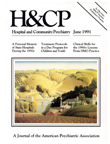Inpatient Psychiatric Morbidity of HIV-Infected Soldiers
Abstract
To determine differences in inpatient psychiatric morbidity, a total of 573 soldiers seropositive for the human immunodeficiency virus (HIV) were matched with 2,266 seronegative soldiers by age, sex, race, marital status, military rank, length of active service, military occupation, and date of HIV test. An HIV-infected individual was seven times more likely to be hospitalized than an uninfected individual. The rate of total hospitalizations was 16 times higher for the HIV-infected soldiers. The median length of hospital stay was six days for the infected soldiers and four days for the control group. The incidence of psychosis, organic mental disorders, and adjustment disorder in the HIV-infected group was significantly higher.
Access content
To read the fulltext, please use one of the options below to sign in or purchase access.- Personal login
- Institutional Login
- Sign in via OpenAthens
- Register for access
-
Please login/register if you wish to pair your device and check access availability.
Not a subscriber?
PsychiatryOnline subscription options offer access to the DSM-5 library, books, journals, CME, and patient resources. This all-in-one virtual library provides psychiatrists and mental health professionals with key resources for diagnosis, treatment, research, and professional development.
Need more help? PsychiatryOnline Customer Service may be reached by emailing [email protected] or by calling 800-368-5777 (in the U.S.) or 703-907-7322 (outside the U.S.).



